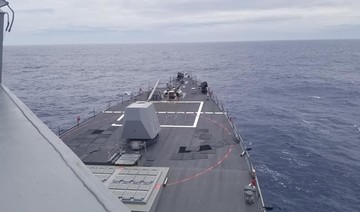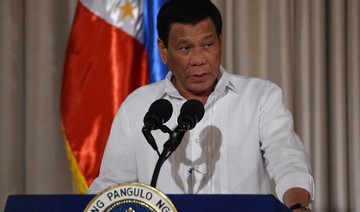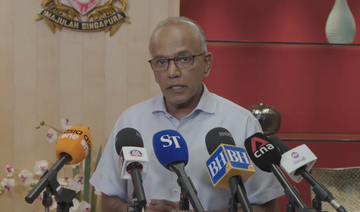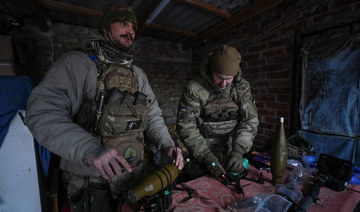BEIJING: The US Navy’s top officer will visit China starting Sunday amid increasing frictions in the South China Sea and other tensions underscoring their rivalry for dominance in Asia.
Chief of Naval Operations Adm. John Richardson will meet with his counterpart Vice Adm. Shen Jinlong and leaders of China’s Central Military Commission during his visit to Beijing and the eastern city of Nanjing lasting through Wednesday, the Navy said.
The goal of the visit, Richardson’s second as head of operations, is to “continue a results-oriented, risk reduction focused dialogue” between the two militaries, the Navy said.
“A routine exchange of views is essential, especially in times of friction, in order to reduce risk and avoid miscalculation,” the release quoted Richardson as saying. “Honest and frank dialogue can improve the relationship in constructive ways, help explore areas where we share common interests, and reduce risk while we work through our differences.”
Richardson and Shen met previously at the 2018 International Seapower Symposium in the US and have held three discussions via video teleconference, the most recent in December, the release said.
China has long chafed at the robust US naval presence in its region, seeing that as a key component of a strategy to contain its development.
In recent years, the South China Sea has become the main area of contention, home to islands, rich fishing grounds, undersea mineral deposits and shipping lanes through which pass an estimated $5 trillion in goods annually. China claims virtually the entire waterway on historical grounds and has strengthened its hold through the fortification of its island holdings and the construction and man-made outposts by piling sand and concrete atop coral reefs.
Five other governments also exercise overlapping claims in the area and while the US takes no formal position on sovereignty, it insists on the right to navigation and overflight, including in air and waters within the territorial limits surrounding China’s holdings.
Such freedom of navigation operations intended to assert such rights have enraged China, which has vowed to take whatever measures to thwart them.
While those usually involve the dispatch of ships and aircraft to warn off US vessels, in late September, a Chinese destroyer came perilously close to the USS Decatur in the South China Sea in what the US Navy called an “unsafe and unprofessional maneuver.” Navy officers downplayed the incident, calling it unfortunate, rare and something they’d like to avoid in future.
Richardson has said such patrols highlight the US position against “illegitimate maritime claims.”
Chinese navy academy researcher Senior Capt. Zhang Junshe said Wednesday that Beijing may further fortify the outposts depending on perceived threats.
While the sides have sought to boost understanding and signed agreements to handle unexpected confrontations at air and sea, deep mistrust lingers.
Last summer, Washington disinvited China from a major US-sponsored naval exercise in what it called “an initial response” to China’s militarization of the South China Sea.
The Pentagon cited strong evidence that China has deployed anti-ship missiles, surface-to-air missile systems and electronic jammers to contested areas in the Spratly Islands. It called on China to remove these systems. Despite strong mutual suspicions, the US had included China in the past two versions of the naval exercise known as Rim of the Pacific, or RimPac, in 2014 and 2016.
China has also warned the US against further upgrading military ties with Taiwan. China threatens to use force against the self-governing island to assert its claim of sovereignty. Under President Donald Trump, the US has taken incremental moves to bolster ties with the island, including renewed arms sales and upgraded contacts between officials.
Chinese President Xi Jinping, who also heads the Central Military Commission, said in a Jan. 2 address that the ruling communists “made no promises to abandon the use of force,” but added that was directed at those advocating formal independence for the island that split from the mainland amid civil war in 1949, along with any foreign forces that might intervene.
Adding to the tensions, China and the US are locked in a tariff dispute that shows little sign of dissipating and Washington has repeatedly accused Beijing of running a cyber espionage campaign to capture commercial and government secrets.
Top US Navy officer to visit Beijing amid heightened South China Sea tensions
Top US Navy officer to visit Beijing amid heightened South China Sea tensions
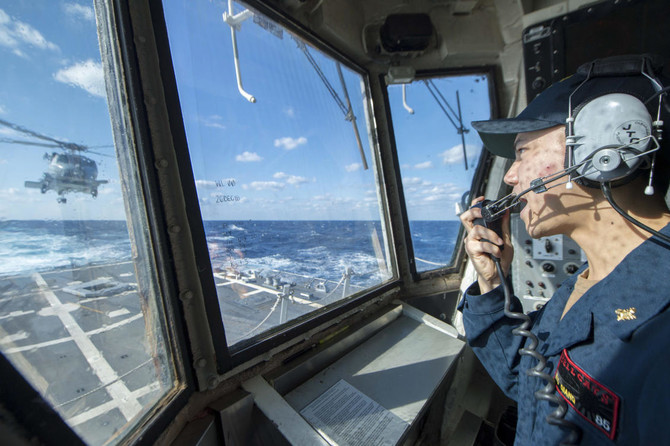
- Chief of Naval Operations Adm. John Richardson will meet with his counterpart Vice Adm. Shen Jinlong and leaders of China’s Central Military Commission
- China has warned the US against further upgrading military ties with Taiwan
Ex-Pakistan PM Imran Khan gets bail but can’t leave jail

Khan, 71, has been in jail since August last year
ISLAMABAD: Former Pakistan Prime Minister Imran Khan was granted bail in Islamabad on Wednesday on land corruption charges but will have to stay in jail to serve time in two other cases, his lawyer said.
The former cricket superstar was indicted last week on charges that he and his wife were gifted land by a real estate developer when Khan was prime minister from 2018-22 in exchange for illegal favors.
Khan, who denies wrongdoing, had filed a bail application before Islamabad High Court.
His party lawyer, Naeem Haider Panjutha, confirmed the granting of bail on social media platform X but said Khan remained in custody after two convictions — one involving the leaking of state secrets and the other his marriage violating Islamic law.
Khan, 71, has been in jail since August last year. In total, he has been convicted in four cases, but sentences in two cases have been suspended.
Khan is named in dozens of cases, including charges of inciting violence against the state in the aftermath of his removal from office in 2022 in a parliamentary vote of no-confidence.
His wife, Bushra Bibi, is also in jail serving time in a case related to unlawfully marrying Khan in 2018.
The case in which Khan was granted bail on Wednesday involves the Al-Qadir Trust, a non-governmental welfare organization set up by Khan and wife when he was still in office.
Prosecutors say the trust was a front for the former premier to receive land as a bribe from a real estate developer. The land includes 60 acres (24 hectares) near Islamabad and another large plot close to Khan’s hilltop mansion in the capital.
In a statement following the bail, Khan’s media team said the land was not for personal gain and Khan had set up a “religious and scientific” educational institution.
It added that the cases were filed to keep Khan in prison and prevent him from participating the Feb. 8 national elections.
Khan faced a string of convictions in the lead-up to the elections but his party-backed candidates still won the most seats. They did not have the numbers to form a government, which was led by an alliance of his rivals led by Prime Minister Shehbaz Sharif.
Singapore marks end of era as PM Lee steps down after 20 years

- PM Lee Hsien Loong will hand over reins to his deputy Lawrence Wong
- Outgoing premier will remain as senior minister in the new cabinet
SINGAPORE: Singapore’s Prime Minister Lee Hsien Loong stepped down on Wednesday, marking the end of an era after nearly two decades in office.
Lee is the son of Lee Kuan Yew, the founder of modern Singapore who stayed in politics until his death in 2015.
His resignation ended a family dynasty, as he formally handed over the reins to his deputy, Lawrence Wong.
As Singapore’s third premier, Lee oversaw his country’s economic growth into an international financial hub and top tourist destination. The island’s gross domestic product per capita more than doubled during his tenure, with the government also credited for competently steering the country through several recessions and successfully fighting the COVID-19 pandemic.
Lee’s succession has been planned for years, but the transition was delayed due to the COVID-19 pandemic. The 72-year-old will remain in Wong’s cabinet as senior minister, as former Singapore premiers have done.
In his final major speech on May 1, Lee urged Singaporeans to rally behind Wong and said that the country’s stable politics had made long-term planning possible.
“As I prepare to hand over Singapore in good order to my successor, I feel a sense of satisfaction and completeness. I have done my duty, and I am very happy I chose this path of public service all those many years ago,” he said.
“But leading a country is never a one-man job. It is always the effort of a national team. Your unwavering support enabled us to get here, with the country in good shape and heading in the right direction.”
Anand Gopalan, who runs a financial and strategy advisory firm, said Singapore managed to keep up with the times under Lee’s leadership.
“With Lee Hsien Loong, … there’s a lot more focus on technology and innovation,” he said.
Singapore also saw growth in entrepreneurship and start-ups, as well as financial technology and artificial intelligence-focused platforms, giving citizens a vast range of career options, he added.
Though the city-state flourished into one of the world’s wealthiest nations, it also became one of the most expensive cities to live in.
“The big problems now are the diminishing jobs, both middle-class and working-class jobs, increased taxes and cost of living,” Gopalan said.
For 63-year-old Alice Rani, Singapore’s transformation throughout the years was commendable.
“I was born in 1961. There have been a lot of changes that sometimes I would say to myself: ‘Wow, it’s amazing what the government did for Singapore’,” Rani told Arab News.
“I like the way our government works, and everything is going (well). There is a lot of improvement, but it is a bit expensive to live here. We can still manage, and the government has been providing a lot of (subsidies and assistance).”
Singaporeans have enjoyed good infrastructure over the years, especially its transportation and pedestrian-friendly streets that are some of the best in Southeast Asia.
“I think for Singaporeans, they benefited a lot. Roads are better, flats are better, and the hawker centers are very convenient for people,” artist Margaret Pereira said.
“With the local infrastructure, there are more trains and train lines being built … There are a lot of differences in the past 20 years.”
German court convicts a Palestinian man of murder over a fatal stabbing on a train last year

- Psychiatric expert testified during the trial that the defendant had psychotic symptoms and post-traumatic stress disorder
BERLIN : A court in Germany convicted a man of murder and sentenced him to life in prison Wednesday for carrying out a fatal stabbing on a train last year.
The state court in Itzehoe convicted the 34-year-old Palestinian, who has been identified only as Ibrahim A. in line with German privacy rules, of murder and attempted murder, German news agency DPA reported.
It found that he fatally stabbed two teenagers and wounded another four passengers seriously in the Jan. 25, 2023 incident in the northern town of Brokstedt, before being overpowered by others on board the regional train traveling from Kiel to Hamburg.
The defendant grew up in the Gaza Strip and came to Germany in 2014.
A psychiatric expert testified during the trial that the defendant had psychotic symptoms and post-traumatic stress disorder, but could be held criminally responsible for his actions. The defense lawyer had called for his client to be moved to a psychiatric institution.
Investigators have said the man had a previous criminal record and had been in pretrial custody in another case before being released days ahead of the attack. He had traveled to an appointment with immigration authorities in Kiel and prosecutors have said he appears to have acted out of frustration.
The severity of the case meant that he likely won’t be eligible for release after 15 years as is usually the case in Germany.
Sri Lanka says 16 citizens killed fighting in Ukraine war

- Soldiers from Sri Lanka’s regional neighbors India and Nepal have also signed up to fight since last year
- Sri Lanka opened an inquiry last week into the recruitment of its citizens for the conflict
COLOMBO: At least 16 Sri Lankan mercenaries have been killed fighting in the war between Russia and Ukraine, the island’s deputy defense minister said Wednesday.
Tens of thousands of Russian soldiers have been killed in Ukraine since the invasion began more than two years ago, and Moscow has been on a global quest for more troops.
Soldiers from Sri Lanka’s regional neighbors India and Nepal have also signed up to fight since last year, with several confirmed deaths in combat from citizens of both countries.
Sri Lanka opened an inquiry last week into the recruitment of its citizens for the conflict that has since identified the participation of 288 retired soldiers from the island nation, deputy defense minister Pramitha Tennakoon said.
“We have confirmed information about 16 who have been killed,” he told reporters in Colombo.
Tennakoon did not say which side of the conflict the soldiers had been fighting on.
But ruling party lawmaker Gamini Waleboda told parliament on Monday that most had been recruited to fight alongside the Russian army.
Those who joined had been duped with promises of high salaries and falsely told they would be given non-combat roles, Waleboda said.
Tennakoon said the recruitment of Sri Lankans was being treated as a human trafficking enterprise and urged military officers not to fall prey to the recruitment drive.
The Sri Lankan government was also in talks with both the Ukrainian and Russian foreign ministries to track down Sri Lankans in the two countries and bring them back safely.
“This is a delicate issue,” Tennakoon said. “We are friends with Russia, we are friends with Ukraine. Both are important for us so we are talking to the foreign ministries to get our people back safely.”
Complaints began pouring in from relatives after the defense ministry established its probe last week to collect information on those who had traveled to both countries to join the war effort.
Sri Lanka has repeatedly warned its citizens against traveling to Russia or Ukraine to join the fighting.
But there are no restrictions on Sri Lankans traveling abroad and large numbers have left in the wake of an unprecedented economic crisis in mid-2022.
Police arrested two retired army officers, including a major general, last week for illegally acting as recruiting agents for Russian mercenary firms.
India and Nepal have also confirmed that numerous citizens of those countries had been recruited to fight alongside the Russian army over the past year.
At least 19 Nepalis had been killed in combat, according to figures from the Himalayan republic published in March.
Russia’s army held off a much-hyped Ukrainian counter-offensive last year and it has since made gains as Kyiv struggles with ammunition and manpower shortages.
Russia suspends traffic at two airports over drone threat

- Ukrainian forces have in recent weeks escalated aerial attacks on Russian border regions
- Russia earlier said it had neutralized 17 Ukrainian drones overnight
MOSCOW: Russia said Wednesday that a major airport near the city of Kazan, 1,000 kilometers (620 miles) from Ukraine, had been temporarily closed after the region was targeted by a Ukrainian attack drone.
Ukrainian forces have in recent weeks escalated aerial attacks on Russian border regions but have also been able to strike targets deep inside Russian territory.
The defense ministry said it had downed a Ukrainian drone over the central region of Tatarstan but did not specify what was the target of the attack.
Two airports in the region, including in the major hub of Kazan, were temporarily closed around the same time, Russian aviation body, Rosaviatsia announced.
“To ensure the safety of civil aircraft, temporary restrictions have been imposed on the work of two airports in Tatarstan — Kazan and Nizhnekamsk,” state news agencies cited the agency as saying.
Russia earlier said it had neutralized 17 Ukrainian drones overnight as Kyiv targeted a fuel depot in the southern city of Rostov, home to Moscow’s military headquarters for its operation in Ukraine.
Russian aerial defense systems intercepted and destroyed 17 drones across several border areas, as well as 10 ATACMS missiles over the annexed Crimean peninsula, the defense ministry said.
Two drones caused explosions at a fuel depot in Rostov without setting off a fire or wounding anyone, local governor Vasily Golubev said on Telegram.
More than two years into the conflict on its territory with its larger and more heavily-armed neighbor, Ukraine has regularly targeted Russian energy facilities and fuel supplies.
Kyiv argues that these attacks are justified as the facilities are used to supply the Russian army.
Ukraine has vowed to take the battle to Russian soil after suffering massive destruction on its territory from more than two years of bombardments.



